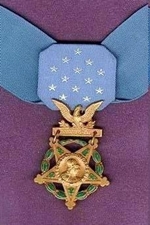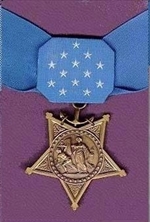Category: Video
Videos of combat operations and interviews with fighting men and women who share their experiences.
Jeremiah Andrew Denton Jr. (born July 15, 1924) is a retired United States Navy rear admiral, naval aviator and a former Republican U.S. senator for the state of Alabama. He spent almost eight years as a prisoner of war in Vietnam and later wrote a book about his experiences. Denton and Tschudy were both held as prisoners of war for almost eight years, four of which were spent in solitary confinement. Denton is best known for the 1966 North Vietnamese television interview he was forced to give as a prisoner, in which he ingeniously used the opportunity to communicate to American Intelligence.
Operation Lam Son 719 — When the U.S. attacked the Ho Chi Minh Trail in Laos, they avoided sending in ground troops, leaving that to South Vietnamese fighters. Pilots like Bob Clewell supported the battle, flying in the largest helicopter operation in the war.
A scout platoon engaged in the final minutes of a hour and a half firefight in eastern afghanistan. June 10th 2011 (15min. Clip).
 Rank and organization: Corporal, U.S. Army, Company G, 187th Airborne Regimental Combat Team.
Rank and organization: Corporal, U.S. Army, Company G, 187th Airborne Regimental Combat Team.
Place and date: Near Wontong-ni, Korea, 31 May 1951. Entered service at: Fowler, Calif. Born: 14 April 1931, Colton, Calif. G.O. No.: 40, 21 April 1962. Citation: Cpl. Hernandez, a member of Company G, distinguished himself by conspicuous gallantry and intrepidity above and beyond the call of duty in action against the enemy. His platoon, in defensive positions on Hill 420, came under ruthless attack by a numerically superior and fanatical hostile force, accompanied by heavy artillery, mortar, and machine gun fire which inflicted numerous casualties on the platoon. His comrades were forced to withdraw due to lack of ammunition but Cpl. Hernandez, although wounded in an exchange of grenades, continued to deliver deadly fire into the ranks of the onrushing assailants until a ruptured cartridge rendered his rifle inoperative. Immediately leaving his position, Cpl. Hernandez rushed the enemy armed only with rifle and bayonet. Fearlessly engaging the foe, he killed 6 of the enemy before falling unconscious from grenade, bayonet, and bullet wounds but his heroic action momentarily halted the enemy advance and enabled his unit to counterattack and retake the lost ground. The indomitable fighting spirit, outstanding courage, and tenacious devotion to duty clearly demonstrated by Cpl. Hernandez reflect the highest credit upon himself, the infantry, and the U.S. Army.
 Rank and organization: Captain (then Comdr.) U.S. Navy, U.S.S. Liberty (AGTR-5).
Rank and organization: Captain (then Comdr.) U.S. Navy, U.S.S. Liberty (AGTR-5).
Place and date: International waters, Eastern Mediterranean, 8-9 June 1967.
Entered service at: Thermal, Calif. Born: 19 November 1925, Wichita, Kans.
Citation: For conspicuous gallantry and intrepidity at the risk of his life above and beyond the call of duty. Sailing in international waters, the Liberty was attacked without warning by jet fighter aircraft and motor torpedo boats which inflicted many casualties among the crew and caused extreme damage to the ship. Although severely wounded during the first air attack, Capt. McGonagle remained at his battle station on the badly damaged bridge and, with full knowledge of the seriousness of his wounds, subordinated his own welfare to the safety and survival of his command. Steadfastly refusing any treatment which would take him away from his post, he calmly continued to exercise firm command of his ship. Despite continuous exposure to fire, he maneuvered

his ship, directed its defense, supervised the control of flooding and fire, and saw to the care of the casualties. Capt. McGonagle’s extraordinary valor under these conditions inspired the surviving members of the Liberty’s crew, many of them seriously wounded, to heroic efforts to overcome the battle damage and keep the ship afloat. Subsequent to the attack, although in great pain and weak from the loss of blood, Captain McGonagle remained at his battle station and continued to command his ship for more than 17 hours. It was only after rendezvous with a U.S. destroyer that he relinquished personal control of the Liberty and permitted himself to be removed from the bridge. Even then, he refused much needed medical attention until convinced that the seriously wounded among his crew had been treated. Capt. McGonagle’s superb professionalism, courageous fighting spirit, and valiant leadership saved his ship and many lives. His actions sustain and enhance the finest traditions of the U.S. Naval Service. (Captain McGonagle earned the Medal of Honor for actions that took place in international waters in the Eastern Mediterranean rather than in Vietnam.)
 Medal of Honor Citation: Leroy A. Petry
Medal of Honor Citation: Leroy A. Petry
Rank and Organization: Staff Sergeant, U.S. Army, Company D, 2d Battalion, 75th Ranger Regiment.
Place and Date: Paktya Province, Afghanistan, 26 May 2008.
Entered service at: New Mexico.
Born: 29 July 1979, Santa Fe, New Mexico.
Citation: For conspicuous gallantry and intrepidity at the risk of his life above and beyond the call of duty, Staff Sergeant Leroy A. Petry distinguished himself by acts of gallantry and intrepidity at the risk of his life above and beyond the call of duty in action with an armed enemy in the vicinity of Paktya Province, Afghanistan, on May 26, 2008. As a Weapons Squad Leader with D Company, 2nd Battalion, 75th Ranger Regiment, Staff Sergeant Petry moved to clear the courtyard of a house that potentially contained high-value combatants. While crossing the courtyard, Staff Sergeant Petry and another Ranger were engaged and wounded by automatic weapons fire from enemy fighters. Still under enemy fire, and wounded in both legs, Staff Sergeant Petry led the other Ranger to cover. He then reported the situation and engaged the enemy with a hand grenade, providing suppression as another Ranger moved to his position. The enemy quickly responded by maneuvering closer and throwing grenades. The first grenade explosion knocked his two fellow Rangers to the ground and wounded both with shrapnel. A second grenade then landed only a few feet away from them. Instantly realizing the danger, Staff Sergeant Petry, unhesitatingly and with complete disregard for his safety, deliberately and selflessly moved forward, picked up the grenade, and in an effort to clear the immediate threat, threw the grenade away from his fellow Rangers. As he was releasing the grenade it detonated, amputating his right hand at the wrist and further injuring him with multiple shrapnel wounds. Although picking up and throwing the live grenade grievously wounded Staff Sergeant Petry, his gallant act undeniably saved his fellow Rangers from being severely wounded or killed. Despite the severity of his wounds, Staff Sergeant Petry continued to maintain the presence of mind to place a tourniquet on his right wrist before communicating the situation by radio in order to coordinate support for himself and his fellow wounded Rangers. Staff Sergeant Petry’s extraordinary heroism and devotion to duty are in keeping with the highest traditions of military service, and reflect great credit upon himself, 75th Ranger Regiment, and the United States Army.
 Rank and Organization: Sergeant, U.S. Marine Corps.
Rank and Organization: Sergeant, U.S. Marine Corps.
Corporal Meyer maintained security at a patrol rally point while other members of his team moved on foot with two platoons of Afghan National Army and Border Police into the village of Ganjgal for a pre-dawn meeting with village elders. Moving into the village, the patrol was ambushed by more than 50 enemy fighters firing rocket propelled grenades, mortars, and machine guns from houses and fortified positions on the slopes above. Hearing over the radio that four U.S. team members were cut off, Corporal Meyer seized the initiative. With a fellow Marine driving, Corporal Meyer took the exposed gunner’s position in a gun-truck as they drove down the steeply terraced terrain in a daring attempt to disrupt the enemy attack and locate the trapped U.S. team. Disregarding intense enemy fire now concentrated on their lone vehicle, Corporal Meyer killed a number of enemy fighters with the mounted machine guns and his rifle, some at near point blank range, as he and his driver made three solo trips into the ambush area. During the first two trips, he and his driver evacuated two dozen Afghan soldiers, many of whom were wounded. When one machine gun became inoperable, he directed a return to the rally point to switch to another gun-truck for a third trip into the ambush area where his accurate fire directly supported the remaining U.S. personnel and Afghan soldiers fighting their way out of the ambush. Despite a shrapnel wound to his arm, Corporal Meyer made two more trips into the ambush area in a third gun-truck accompanied by four other Afghan vehicles to recover more wounded Afghan soldiers and search for the missing U.S. team members. Still under heavy enemy fire, he dismounted the vehicle on the fifth trip and moved on foot to locate and recover the bodies of his team members. Corporal Meyer’s daring initiative and bold fighting spirit throughout the 6-hour battle significantly disrupted the enemy’s attack and inspired the members of the combined force to fight on. His unwavering courage and steadfast devotion to his U.S. and Afghan comrades in the face of almost certain death reflected great credit upon himself and upheld the highest traditions of the Marine Corps and the United States Naval Service.